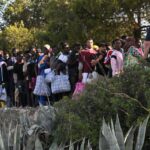Asmaa Al-Tayaeb, a 52-year-old widow, fled her home city of Omdurman a few days after Sudan erupted into violence, and made her way across the northern border to Egypt.
For her and her family – three children, her mother and her disabled brother – escaping the fighting between the Sudanese Armed Forces and the paramilitary Rapid Support Forces (RSF), which has so far left at least 750 dead, was not an easy task.
“As we left Omdurman, we were stopped by forces from the army and the RSF, and both wanted bribes, and the trip was full of danger… the bullet sounds stopped when we got close to the [Egyptian] border,” Al-Tayaeb told Middle East Eye.
According to the UN Refugee Agency (UNHCR), more than 56,000 people have crossed from Sudan to Egypt since the fighting began last month, only 1 percent of which are foreign expats.
Outside the border gates, Egyptian police and military personnel are deployed in their hundreds in various points with heavy weapons and armoury.
Troops from the Southern Military Region and police secure the area and as buses arrive, several families report that young men have to go through additional checks and sometimes interrogation by the State Security officers at the borders. Meanwhile, police conscripts in civilian clothes roam the area and try to mingle among the newly arrived refugees.
Youssef Al-Moslem, a 57-year-old teacher, arrived in the southern Egyptian city of Aswan in the first days of what he called the “exodus”.
He arrived with his brother and nephew, while other male members of the family stayed in the border area with the women and children, in order to guarantee housing and shelter.
‘We are not here to play politics or to irritate people. We are literally fleeing for our lives and the lives of our parents’
– Mohamed Imam, refugee
“In the first days, the border only allowed hundreds every day. And we had to stay around two days in the buses until we were allowed,” he told MEE as he arrived at the border, coming from Aswan to welcome the rest of his family.
“In the later weeks, entry became smoother and the number of employees increased and members of the Red Crescent were all over the border helping.”
Several of the refugees that MEE spoke to have complained about the sheer number of bribes they had to pay in Egypt and the randomness of the treatment and checks. In addition, the lack of medical care was a repeated complaint as many arrived dehydrated and exhausted from days being driven in the desert, and in many cases on top of buses and trucks.
Medical services outside the border include two ambulances provided by the ministry of health and a Red Crescent unit overrun by hundreds of women and children.
“Dozens of the children and women come sick with low blood sugar, dehydration, sun stroke, or exhaustion,” a doctor working with one of the ambulances told MEE.
“Yet we as employees of the ministry of health don’t have enough equipment to cover all these cases.”
The doctor said that they and other volunteers from Aswan had begun collecting money for the refugees so they could acquire necessary products.
“We provided sanitary products for women, baby formula, minerals, vitamins, water, juice, sweets, painkillers, insulin, fever medication and others,” she said, adding that other unorganised volunteers buy and distribute phone credit charging cards to distribute to refugees so they can either call their families back in Sudan, or register for refugee status with the UNCHR.
However, she said if the government continued to refuse to intervene in the situation, things would very quickly deteriorate.
Others have complained that security forces treated them with suspicion on arrival.
Mohamed Imam, 20, an engineering student, said officers detained him for six hours, waiting while they had dinner and watched a Premier League football match, before they started interrogating him.
“They asked me whether I am an Islamist and whether I joined the protests in 2019 and 2020, and demanded that I show them my Facebook and Twitter accounts,” he said.
Imam and two other young men confirmed to MEE that the officers asked them to inform on any other Sudanese nationals who might be affiliated with the country’s Islamists or who are members of youth leftist groups.
“We are not here to play politics or to irritate people. We are literally fleeing for our lives and the lives of our parents… the military and the militias are playing a game and we are outside the pitch,” Imam added.
While Imam was allowed to leave, he said that in the office where he was held, dozens more were being detained, including families. MEE could not confirm this information.
Rising demand
Different minor league initiatives and social media campaigns have been mobilising to provide support and assistance to the thousands in need.
However, there are limits to what NGOs and individuals can achieve, amid the haphazardness of the entry and the lack of coordination from the Egyptian government.
In addition to the Egyptian Red Crescent, other non-governmental delegations and missions by the UN continue to provide relief items and lifesaving support such as food, water, hygiene kits, transportation and medical assistance.
‘Some of the Aswan residents welcomed us with open arms, but others want to take advantage of the situation’
– Youssef Al-Moslem, refugee
A good proportion of the refugees can be said to be relatively well-off, only fleeing to Egypt for physical safety. The trip from Sudan to Aswan has been priced at $500, while staying in Aswan can cost around $180 per night in hotels.
A hotel worker in a two-star hotel told MEE that “the room which used to cost 300 EGP per night, now costs 100 USD per night. In the four and five stars [hotels], prices are now $150 and $180.”
MEE contacted three four-star hotels to ask about rooms, and staff asked for the nationality “as rooms for foreigners are now in more demand so they are higher in price”.
Al-Moslem complained about the lack of monitoring of the prices of different goods and essentials.
“Some of the Aswan residents welcomed us with open arms, but others want to take advantage of the situation,” he said.
While Al-Moslem and his family were able to secure a moderately priced two storey house, others are struggling to find decent accommodation in the already stretched economy of Aswan.
Naema Saqr, a 29-year-old physical therapist who also left with her family, said that her house was used by the Sudanese army to attack troops of the RSF.
“All of my children and nieces are traumatised, and we spent one night in the street because we couldn’t find a flat,” she explained.
Saqr was able to find shelter in the village of Abu Simbel. Despite the trauma she said she suffered, she was insistent on continuing her journey to Cairo, hoping to make use of her degree and specialised profession.
“Sleeping on concrete in Aswan is better than not sleeping all night from the gunshots,” she said.
Looking for work
Those who are less economically capable were forced to look for work the day they entered Egypt.
Hamdi Al-Zawawi, 30, and four of his cousins found a contractor who would pay them 200 EGP (around $6) per day to work in construction.
“We spent all the money we had on the trip from Khartoum to Hafla, and then to Aswan. Each of us paid $600,” Al-Zawawi told MEE.
“We saw horrible things coming out of Khartoum … It’s a shame. It was a beautiful city despite all the difficulties. On the road, you see bodies lying in the street and soldiers looting the bodies.”
While the situation is temporarily sorted for Al-Zawawi and his cousins, Salama, a street vendor who has just arrived with her family from the border, and lost her brother in the fighting, awaits an unknown future.
“We don’t know where to go or where we will be next week,” she told MEE.
“We don’t know whether to grieve the dead or over our future.”
Despite the bleak images at the border and the days of uncertainty, some refugees have praised the welcome they received from Aswan’s residents.
Mofeed Gonbalan, a 34-year-old newly married engineer, arrived at the border last week with his family, but was offered a flat by a random stranger in the nearby village of Daraw.
In Daraw, MEE also observed around 100 Sudanese refugees being welcomed as three buses arrived.
Sami Al-Khateeb, a resident of the village and an owner of a grocery shop told MEE that there was a “historic bond between all of Sudan and Aswan, whether it is by blood, marriage, business or solidarity.”
“The whole village gathered after the Friday prayer to celebrate and welcome our Sudanese brothers and sisters. Whoever has a piece of bread, they will divide it between him and his Sudanese brother.”
Source : Middle East Eye
















